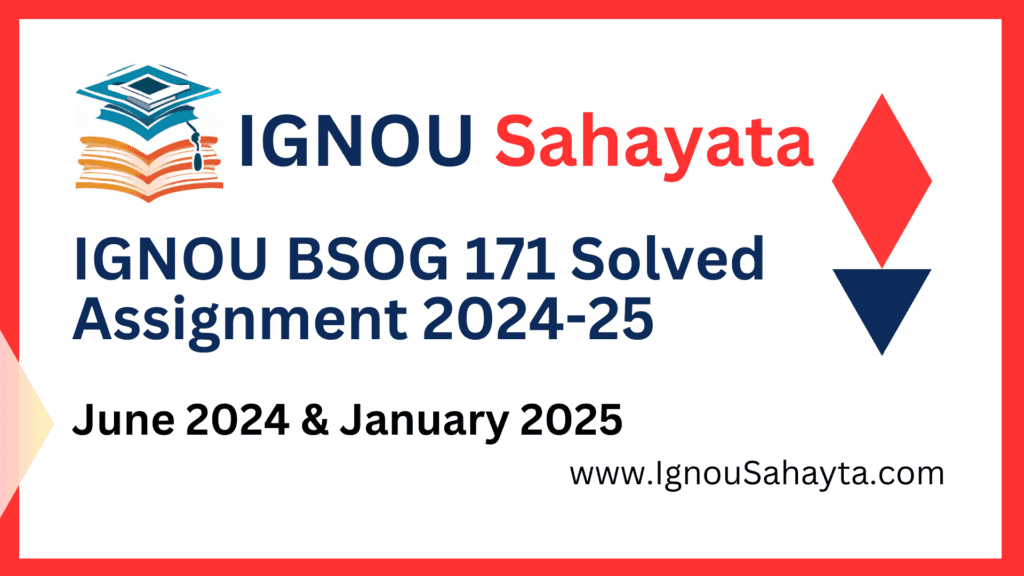Presenting the most recent update to our collection of IGNOU BSOG 171 Solved Assignment 2024–25 PDF Download resources! You are at the correct location if you are enrolled in the BSOG 171 course for the Indira Gandhi National Open University (IGNOU) Bachelor of Arts (General) program. English and Hindi-language assignments are available from us. You may approach the problems this course presents with confidence and accuracy if you use this painstakingly created Solved Assignment PDF.

We explore the fundamental ideas, assignments, and concepts that underpin this course as we delve into the details of IGNOU BSOG 171 in this extensive guide. Our Solved Assignment PDF offers thorough answers and insights to any problems you may be having with challenging subjects or looking for clarification on assignment criteria.
The IGNOU BSOG 171 Solved Assignment 2024–25 PDF Download gives you access to professionally written answers that meet IGNOU requirements. Bid farewell to ambiguity and doubt and welcome to a methodical approach to learning your content and succeeding in your academic endeavors.
Click To Download Full IGNOU BSOG 171 Solved Assignment
BSOG 171 Solved Assignment 2024-25 Hindi Medium
BSOG 171 Solved Assignment 2024-25 English Medium
IGNOU BSOG 171 Solved Assignment 2024-25
The BSOG 171 course offered by IGNOU, titled “Indian Society: Images and Realities,” provides a comprehensive exploration of the social structure, cultural diversity, and complex realities of Indian society. This course encourages students to critically examine the various dimensions of Indian society, ranging from its historical evolution to its contemporary challenges. It focuses on understanding the contrast between how Indian society is often perceived through popular images and the actual lived realities of its diverse population. Through this course, students gain insight into the dynamics of caste, class, religion, and gender, which have significantly shaped the fabric of Indian society.
The BSOG 171 assignment is an integral part of the course, allowing students to delve deeper into specific issues related to Indian society. Assignments may require students to analyze key social institutions like the family, marriage, or education in the Indian context. Alternatively, students might explore topics such as rural and urban divides, social inequality, or the impact of globalization on Indian society. By engaging with these topics, students develop a critical understanding of how societal images—often shaped by media, tradition, or political discourse—differ from the everyday experiences and challenges faced by people across the country.
One of the central themes of the BSOG 171 assignment is the exploration of the tension between tradition and modernity in Indian society. Students may be tasked with examining how traditional institutions, such as the caste system or patriarchal norms, continue to influence contemporary life despite India’s rapid modernization and globalization. Assignments might include case studies, surveys, or research on specific communities to highlight how these traditional structures either adapt to or resist the pressures of modernity. This helps students appreciate the complexities of social change in a culturally diverse country like India.
Another important focus of the assignment is understanding the concept of “unity in diversity,” which is often portrayed as a defining image of India. While this phrase highlights India’s cultural richness and pluralism, the assignment might require students to critically evaluate whether this image holds true in the face of growing social, economic, and political inequalities. Through these analyses, students gain a more nuanced perspective on both the strengths and contradictions within Indian social structures.
Overall, the BSOG 171 course and its assignments encourage students to move beyond surface-level images of Indian society and engage with its deeper realities. By critically examining issues of inequality, social change, and cultural diversity, students are better equipped to understand the complexities of Indian society and contribute meaningfully to discussions on social reform and development. The course fosters analytical thinking and social awareness, making it valuable for students interested in sociology, social work, public policy, and related fields.